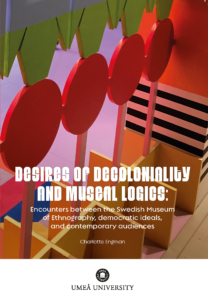Niina Koskihaara is defending her thesis in ethnology at University of Turku on November 10, 12:00-16:00 at Arje Scheinin -sali, DENTALIA, Lemminkäisenkatu 2, 20520, TURKU. The defence can also be followed online.
Read more here
English abstract:
When the municipality ceased to exist. Village and local heritage associations as reactive actors to municipal mergers
The topic of this study is the restructuring of local government and services in the early 2000s (PARAS project) and its impacts on communities operating at the local level. The research project examines how the reform, initiated at the highest level of state administration, affected the activities and operational environment of village and local heritage associations as well as the cultural processes resulting from the municipal mergers at the local level. The actors involved with village and local heritage associations have most clearly focused their efforts on specific villages and local regions. During the municipal restructuring, concerns were expressed at the local level about the villages and home regions being left behind as neglected and remote villages, causing the sense of place and local identity to disappear.
The study focuses on nine village and local heritage associations that operate in municipalities where the reform was carried out in 2007 and 2009: Mynämäki (Mynämäki and Mietoinen in 2007), Pälkäne (Pälkäne and Luopioinen in 2007), Salo (Salo, Halikko, Kiikala, Kisko, Kuusjoki, Muurla, Perniö, Pertteli, Suomusjärvi and Särkisalo in 2009) and Hämeenlinna (Hauho, Hämeenlinna, Kalvola, Lammi, Renko and Tuulos in 2009). The main data for the research project consists of thematic interviews conducted with association actors. In addition, the interviews include discussions with the main actors in LEADER groups and cultural associations. The method employed for analysing the data is close reading. The theoretical framework guiding the research and shaping the close reading approach is based on Lefebvre’s triad of social space, which adopts the perspective of viewing the municipality as a conceptualised, perceived and lived space.
The study demonstrates that the restructuring of local government and services was not merely about administrative reorganisation but also concretely impacted community activities and the operational environment as a whole. Municipalities are important partners for village and local heritage associations. The municipal restructuring brought about alterations in the forms and prerequisites of such relationships. The operational methods of the new municipality required the associations to adapt, redirect their approaches and engage in advocacy with respect to the municipality. The municipal mergers also triggered processes whereby village and local heritage associations became subject to new expectations, leading them to reconsider the contents of their activities, their (geographical) scope and their inter-associational collaboration. The removal of municipal borders also revealed the ways in which the former ‘boundaries’ between communities had impacted municipal relations.
The characteristics of places, family and friendship ties, as well as involvement in associations, serve as factors emotionally connecting associational actors at the local level. The interviewees’ descriptions of their personal local identities appear more fluid and shifting in the study than their identities at the community level, whose modes and areas of operation are defined more narrowly. People are the most significant resource in association activities, but they also pose a threat to the continuation of operations if associations fail to attract new participants. Changes that impact residents’ everyday lives at the local level motivate people to participate in association activities.
The thesis can be found here.

